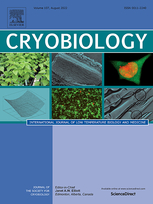
Retained structural integrity of collagen and elastin within cryopreserved human heart valve tissue as detected by two-photon laser scanning confocal microscopy.
Author(s) : GERSON C. J., GOLDSTEIN S., HEACOX A. E.
Type of article: Article
Summary
Cryopreservation is commonly used for the long-term storage of heart valve allografts. Despite the excellent hemodynamic performance and durability of cryopreserved allografts, reports have questioned whether cryopreservation affects the valvular structural proteins, collagen and elastin. This study uses two-photon laser scanning confocal microscopy to evaluate the effect of cryopreservation on collagen and elastin integrity within the leaflet and conduit of aortic and pulmonary human heart valves. To permit pairwise comparisons of fresh and cryopreserved tissue, test valves were bisected longitudinally with one segment imaged fresh and the other imaged after cryopreservation and brief storage in liquid nitrogen. Collagen was detected by second harmonic generation stimulation and elastin by autofluorescence excitation. Qualitative analysis of all resultant images indicated the maintenance of collagen and elastin structure within leaflet and conduit post-cryopreservation. Analysis of the optimized percent laser transmission (OPLT) required for full dynamic range imaging of collagen and elastin showed that OPLT observations were highly variable among both fresh and cryopreserved samples. Changes in donor-specific average OPLT in response to cryopreservation exhibited no consistent directional trend. The donor-aggregated results predominantly showed no statistically significant change in collagen and elastin average OPLT due to cryopreservation. Since OPLT has an inverse relationship with structural signal intensity, these results indicate that there was largely no statistical difference in collagen and elastin signal strength between fresh and cryopreserved tissue. Overall, this study indicates that the conventional cryopreservation of human heart valve allografts does not detrimentally affect their collagen and elastin structural integrity. [Reprinted with permission from Elsevier. Copyright, 2009].
Details
- Original title: Retained structural integrity of collagen and elastin within cryopreserved human heart valve tissue as detected by two-photon laser scanning confocal microscopy.
- Record ID : 2010-1661
- Languages: English
- Source: Cryobiology - vol. 59 - n. 2
- Publication date: 2009/10
- DOI: http://dx.doi.org/10.1016/j.cryobiol.2009.06.012
Links
See the source
Indexing
-
Diffusion of dimethyl sulfoxide in tissue engin...
- Author(s) : BERNEMANN I., MANUCHEHRABADI N., SPINDLER R., et al.
- Date : 2010/11
- Languages : English
- Source: CryoLetters - vol. 31 - n. 6
View record
-
Investigation of the influence of cell density ...
- Author(s) : MATSUMURA Y., UJIHIRA M., NOGAWA S., et al.
- Date : 2007/09
- Languages : English
- Source: Cryo-Letters - vol. 28 - n. 5
View record
-
AN APPARATUS FOR FREEZE-FRACTURING SPECIMENS OF...
- Author(s) : LAMBERTY B. G.
- Date : 1981
- Languages : English
- Source: J. Microsc. - 121; part. 3; 347-350.
View record
-
Silkworm (Bombyx mori) cryopreservation: embryo...
- Author(s) : JINGADE A. H., SRINIVASA BABU G. K., LEKHA G., et al.
- Date : 2013/01
- Languages : English
- Source: CryoLetters - vol. 34 - n. 1
View record
-
THE EFFECT OF LIQUID NITROGEN SUBMERSION ON CRY...
- Author(s) : ADAM M.
- Date : 1990
- Languages : English
- Source: Cryobiology - vol. 27 - n. 6
View record
